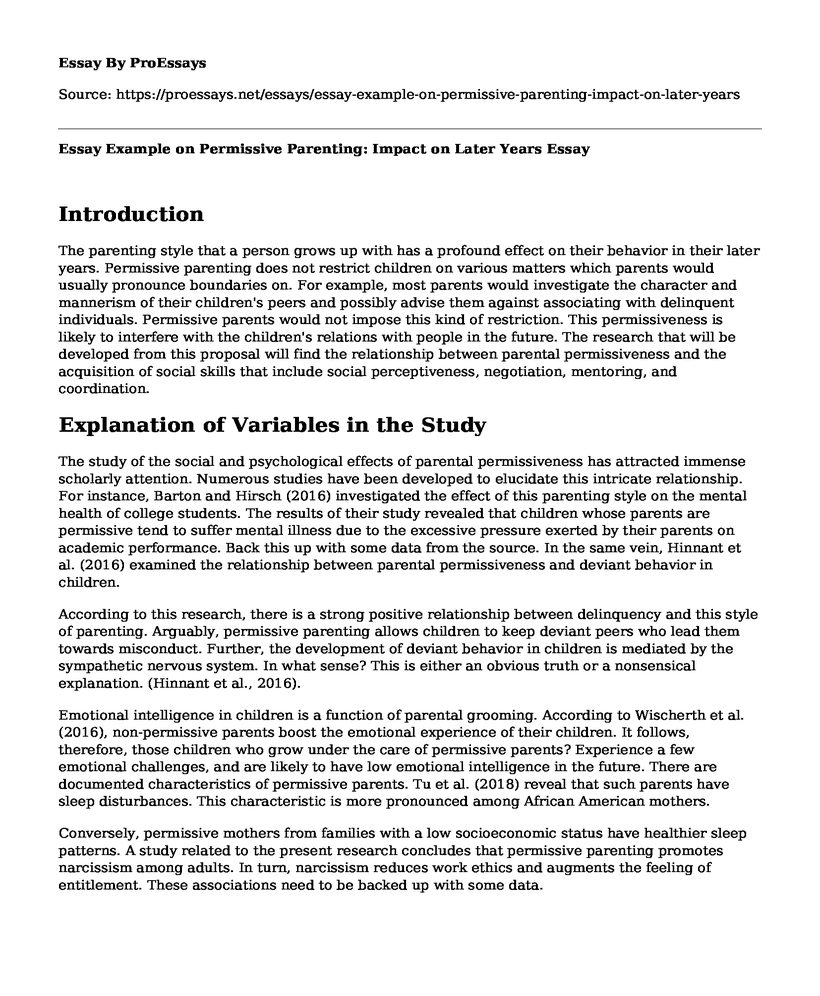Introduction
The parenting style that a person grows up with has a profound effect on their behavior in their later years. Permissive parenting does not restrict children on various matters which parents would usually pronounce boundaries on. For example, most parents would investigate the character and mannerism of their children's peers and possibly advise them against associating with delinquent individuals. Permissive parents would not impose this kind of restriction. This permissiveness is likely to interfere with the children's relations with people in the future. The research that will be developed from this proposal will find the relationship between parental permissiveness and the acquisition of social skills that include social perceptiveness, negotiation, mentoring, and coordination.
Explanation of Variables in the Study
The study of the social and psychological effects of parental permissiveness has attracted immense scholarly attention. Numerous studies have been developed to elucidate this intricate relationship. For instance, Barton and Hirsch (2016) investigated the effect of this parenting style on the mental health of college students. The results of their study revealed that children whose parents are permissive tend to suffer mental illness due to the excessive pressure exerted by their parents on academic performance. Back this up with some data from the source. In the same vein, Hinnant et al. (2016) examined the relationship between parental permissiveness and deviant behavior in children.
According to this research, there is a strong positive relationship between delinquency and this style of parenting. Arguably, permissive parenting allows children to keep deviant peers who lead them towards misconduct. Further, the development of deviant behavior in children is mediated by the sympathetic nervous system. In what sense? This is either an obvious truth or a nonsensical explanation. (Hinnant et al., 2016).
Emotional intelligence in children is a function of parental grooming. According to Wischerth et al. (2016), non-permissive parents boost the emotional experience of their children. It follows, therefore, those children who grow under the care of permissive parents? Experience a few emotional challenges, and are likely to have low emotional intelligence in the future. There are documented characteristics of permissive parents. Tu et al. (2018) reveal that such parents have sleep disturbances. This characteristic is more pronounced among African American mothers.
Conversely, permissive mothers from families with a low socioeconomic status have healthier sleep patterns. A study related to the present research concludes that permissive parenting promotes narcissism among adults. In turn, narcissism reduces work ethics and augments the feeling of entitlement. These associations need to be backed up with some data.
Your hypothesis
Permissive parenting tends to affect the upbringing of children in a negative way.
What do you predict will happen?
Children will get influenced much will the outside world, and this will create conflict between them and their families.
What do you predict the relationship will look like?
There is a likelihood of the relationship to remain inadequate in the long-run in case no action is taken to ensure that parents stop being lenient.
Why have you made this prediction?
Because children are greatly influenced by exposure, if parents let their children to be exposed much to the outside world, then there is a higher likelihood of them getting lost easily.
References
Barton, A. L., & Hirsch, J. K. (2016). Permissive parenting and mental health in college students: Mediating effects of academic entitlement. Journal of American college health, 64(1), 1-8.
Hinnant, J. B., Erath, S. A., Tu, K. M., & El-Sheikh, M. (2016). Permissive parenting, deviant peer affiliations, and delinquent behavior in adolescence: The moderating role of sympathetic nervous system reactivity. Journal of abnormal child psychology, 44(6), 1071-1081.
Tu, K. M., ElmoreStaton, L., Buckhalt, J. A., & ElSheikh, M. (2018). The link between maternal sleep and permissive parenting during late adolescence. Journal of sleep research, 27(5), e12676.
Wischerth, G. A., Mulvaney, M. K., Brackett, M. A., & Perkins, D. (2016). The adverse influence of permissive parenting on personal growth and the mediating role of emotional intelligence. The Journal of Genetic Psychology, 177(5), 185-189.
Cite this page
Essay Example on Permissive Parenting: Impact on Later Years. (2023, May 21). Retrieved from https://proessays.net/essays/essay-example-on-permissive-parenting-impact-on-later-years
If you are the original author of this essay and no longer wish to have it published on the ProEssays website, please click below to request its removal:
- Literature Review on Verbal and Non-verbal Communication Between Nurses
- The Short-Term and Long-Term Effects of Divorce on Children Essay
- Freedom Is a Natural Condition of a Person - Essay Sample
- Essay Sample on Racial Sensitivity: America vs. Other Nations
- Essay Example on God's Image: Christianity Enhances Society's Morality
- Leasehold Estate: Rights & Responsibilities of Tenants & Landlords - Essay Sample
- Behold! A Parent's Dream: My Son Achieves Milestone at Finals! - Essay Sample







